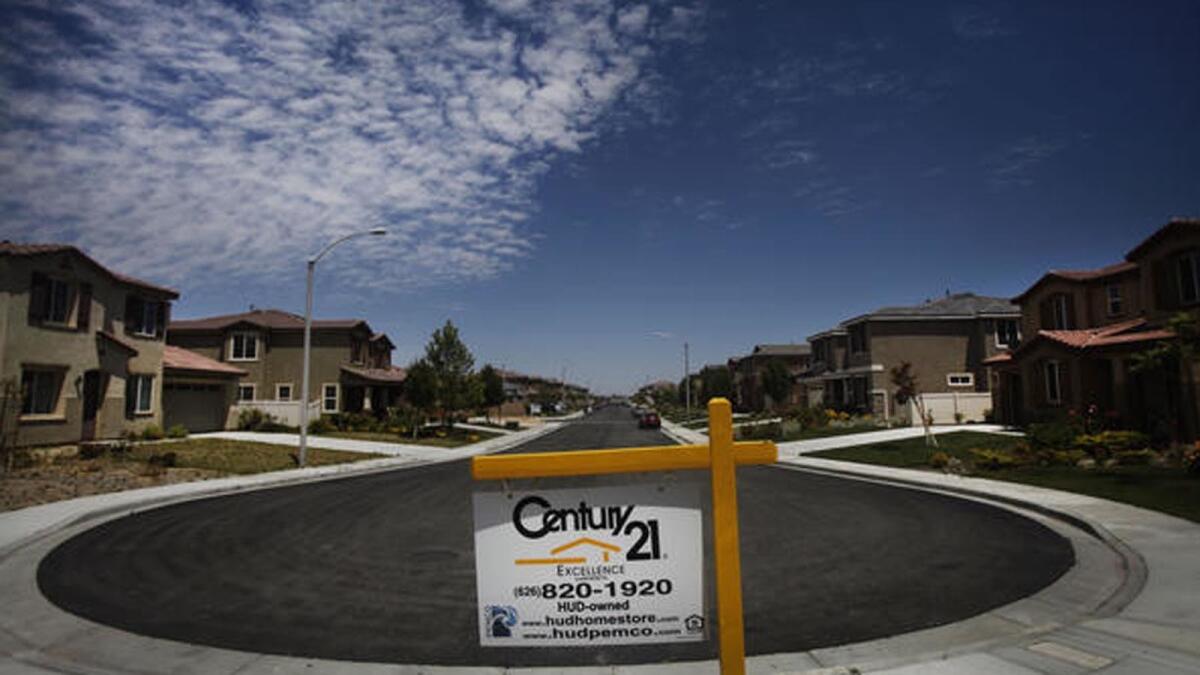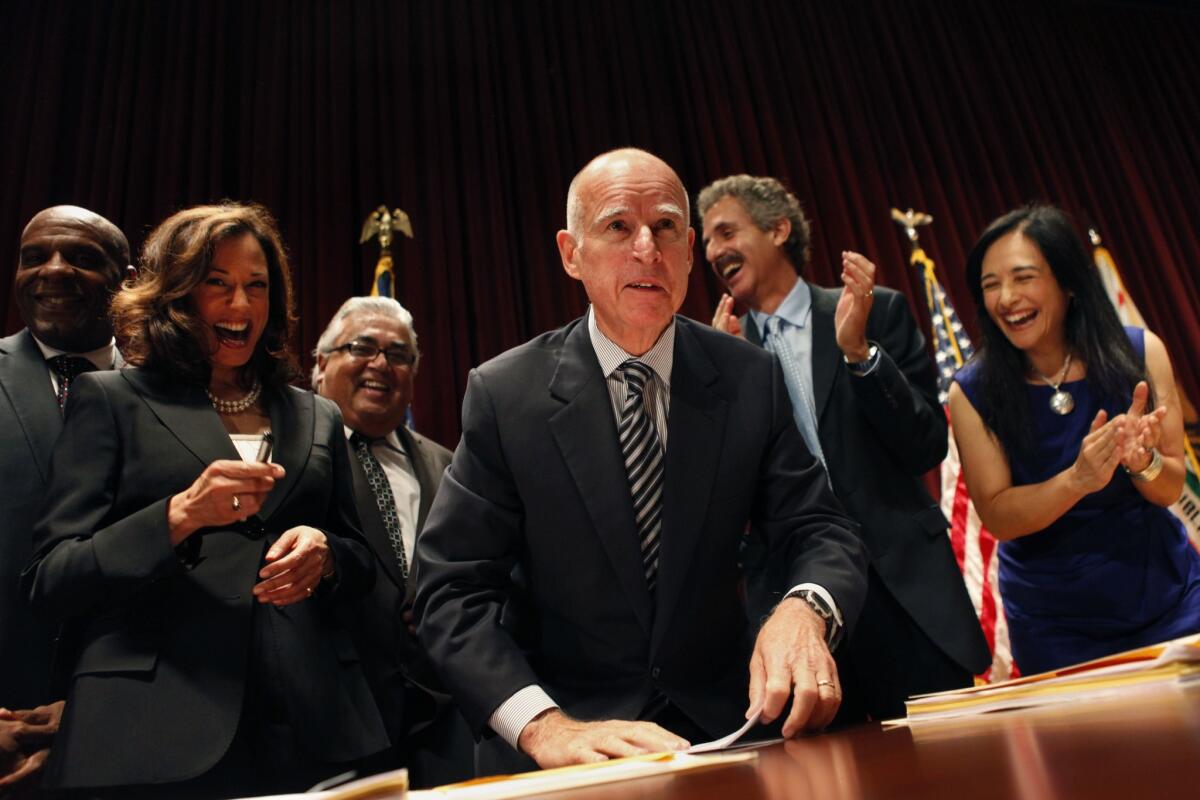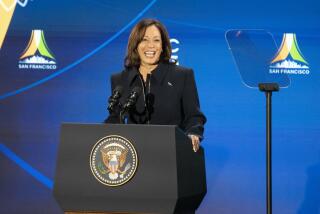$25-billion foreclosure settlement was a victory for Kamala Harris in California, but it wasn’t perfect

State Atty. Gen. Kamala Harris was showered with applause at February’s California Democratic Party convention after spelling out how she went up against the nation’s five largest mortgage firms to help deliver a landmark $25-billion national settlement.
Harris spoke of the heat she took for briefly pulling the state out of settlement talks. Her hardball tactics paid off, Harris told her audience in San Jose, and brought $20 billion in financial relief to California homeowners flattened by the foreclosure crisis.
The mortgage agreement has become one of Harris’ signature accomplishments as state attorney general and, in her Senate campaign against Orange County Rep. Loretta Sanchez, has anchored her message of being a self-described “fearless” leader for California. She has received national acclaim for her tenacious negotiating during the settlement talks, which substantially increased the direct relief provided to her home state.
But the type of relief provided to California homeowners also fell short of initial promises.
One man in the audience that February told Harris that she had promised years before not only to deliver assistance to homeowners, but to lock up those responsible.
“How many bankers went to jail?” he asked the attorney general and U.S. Senate candidate.
Harris told the man she sympathized with his frustration and explained that the state did its best with the evidence it had.
“There were homeowners that were, at that moment and each day, holding on by the fingernails trying to keep their homes,” Harris told The Times in an interview last week.
In September 2011, Harris pulled California out of the nationwide mortgage settlement talks after a coalition of state attorneys general and federal agencies spent nearly a year trying to hammer out a deal with the nation’s five largest mortgage servicers: Bank of America Corp., Wells Fargo & Co., JPMorgan Chase & Co., Citigroup Inc. and Ally Bank/GMAC Mortgage. The banks were accused of using illicit tactics to wrongfully foreclose on homeowners.
Harris’ decision delivered a major setback to the negotiations. But she said the pending deal failed to provide adequate relief to California and shielded the banks from future investigations into the financial practices that led to the foreclosure crisis. Harris was under increasing pressure from union leaders, housing rights activists and some California politicians.
“As the fraud was being uncovered, many of the AGs were yelling ‘Settle, settle, settle.’ They just wanted to get their hands on the money,” said Sen. Elizabeth Warren (D-Mass.), who during the negotiations was setting up the Consumer Financial Protection Bureau for the Obama administration. Warren has endorsed Harris for U.S. Senate and has appeared in one of the attorney general’s campaign ads. “[Harris] was the one who said ‘No, we have to do better, and we have to investigate more. Too many families have been destroyed by the crisis and the illegal activity of these banks.’”
Harris made the decision to pull out of the talks after she met personally with representatives from the banks, saying that the deal they were offering would have provided just $2 billion to $4 billion to California. Harris has dismissed the deal as “crumbs on the table.”
“What they were offering didn’t come near acknowledging what damage had been done,” Harris told The Times.
When the nationwide mortgage settlement was reached more than four months later, California had secured separate commitments from the three biggest mortgage servicers — Bank of America Corp., Wells Fargo & Co. and JPMorgan Chase & Co.
The three banks agreed to provide $12 billion in principal reductions on home loans in California. State homeowners would see $18 billion in overall financial relief, Harris said. In the end, the banks actually provided $18.4 billion in debt relief and $2 billion in other financial assistance. The California deal also provided incentives for the banks to focus relief on California’s hardest-hit counties, as well as imposing penalties if they failed to do so. Under the agreement, California also had its own independent monitor to oversee the debt relief
“This issue has never been about anything other than allowing homeowners, hardworking people, to be able to stay in their homes,” Harris said during a February 2012 news conference announcing the settlement.
But many Californians who received assistance under the settlement did not stay in their homes.

Harris’ office released an estimate stating that short sales would account for a relatively small portion of the relief at $3.1 billion. But, in the end, approximately half of the $18.4 billion in debt relief given to California homeowners was through short sales — $9.2 billion. In short sales, the banks take a loss because they allow owners to sell their homes for less than the amount owed. Those homeowners, however, must find another place to live.
Harris told The Times she was surprised by the number of California homeowners who opted for short sales rather than staying in their homes and having a portion of their home loan forgiven and monthly payment reduced.
“There was a large number of homeowners who just didn’t want to have the burden of the debt because they had also lost their jobs,” Harris said. “Everyone who received [mortgage] relief still had a mortgage to pay.”
Under the settlement, California homeowners received $9.2 billion in principal forgiveness on first and second mortgages, according to a 2013 report by UC Irvine law professor Katherine M. Porter, Harris’ appointed monitor for the program. In total, 84,102 California families received reductions in their first or second mortgages.
More than half of the $9.2 billion in principal loan forgiveness issued in California was applied to second mortgages, according to Porter’s report.
Nationwide, many of the second mortgages that that were reduced or totally forgiven under the settlement were already delinquent. It was unlikely that the banks would have recovered much of that money, said economist Laurie Goodman, co-director of the Urban Institute’s Housing Finance Policy Center.
“It’s clear that they were writing off loans that were essentially dead,” Goodman said.
Homeowners did benefit from having the weight of these debts removed and also from being able to sell their homes at a loss in a short sale, Goodman said, which allowed them to get out of homes they could no longer afford and spared neighborhoods from being blighted by foreclosures.
Forgiving second mortgages may not have inflicted much pain on the banks, Porter said, but it was a major benefit to many homeowners. With no second mortgage, their monthly payments were reduced, allowing them to keep their homes.
Kevin Stein of the California Reinvestment Coalition said that, under the terms of the mortgage settlement, very little information was publicly available about who received debt relief. Absent was any breakdown by race, income levels or neighborhoods, so there was no way to tell how much of the financial assistance was going to homeowners in Brentwood versus Boyle Heights, for instance.
“We serve lower-income people. People of color. We wanted to know, who is getting the help?” he said. “Those questions are hard to answer because there was not a tracking program.”
Rob McKenna, Washington state’s former state attorney general, said despite criticism that the settlement was too easy on the banks, real homeowners received tangible relief under the agreement.
“Even if we had gotten more money through litigation, it would have delayed the relief for years,” said McKenna, a Republican who was among the lead negotiators in the national settlement. “At some point you have to decide that it’s more important to get relief to consumers sooner than to get more through the court.”
One of the major victories that resulted from the settlement was the new loan servicing rules and requirements on financial institutions to prevent banks from using questionable foreclosure practices in the future, said Michael Troncoso, Harris’ senior counsel in the mortgage settlement negotiations.
In 2012, Harris also helped push through a bill in the California Legislature that offered homeowners some of the strongest protections in the nation against aggressive foreclosure tactics by banks, which was credited in part for a plunge in foreclosures in the state. The measure also gave private citizens the right to sue financial institutions if they violated the law.
Shortly after taking office, Harris created a mortgage fraud task force that not only assisted with the mortgage settlement, but also went after financial firms that targeted homeowners facing foreclosure. The task force also took legal action against the banks and financial ratings firms for the massive losses that California’s two giant public pension systems, the California Public Employees’ Retirement System and California State Teachers’ Retirement System, sustained after unknowingly investing in securities that included risky subprime mortgages.
Harris’ office collected $921 million in mortgage-backed securities settlements with JPMorgan Chase & Co., Citigroup, Inc., Bank of America Corp., Standard & Poor’s and Goldman Sachs.
Troncoso, who led the mortgage fraud strike force, said building a criminal case against bankers involved in the foreclosures that led to the national mortgage settlement would have been “extremely difficult.”
Harris acknowledges as much.
“I too, like most Americans, am frustrated. Clearly crimes occurred and people should go to jail,” Harris said. “But we went where the evidence took us.”
Twitter: @philwillon
ALSO:
California’s U.S. Senate candidates are on their own as the national Democratic Party sits it out
8 things to know about Senate candidate Kamala Harris’ career gold stars and demerits
8 things to know about Senate hopeful Loretta Sanchez’s 20-year political career
Updates on California politics
More to Read
Get the L.A. Times Politics newsletter
Deeply reported insights into legislation, politics and policy from Sacramento, Washington and beyond. In your inbox three times per week.
You may occasionally receive promotional content from the Los Angeles Times.







